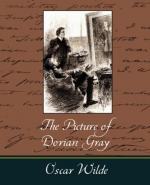“One evening about seven o’clock I determined to go out in search of some adventure. I felt that this gray, monstrous London of ours, with its myriads of people, its splendid sinners, and its sordid sins, as [25] you once said, must have something in store for me. I fancied a thousand things.
“The mere danger gave me a sense of delight. I remembered what you had said to me on that wonderful night when we first dined together, about the search for beauty being the poisonous secret of life. I don’t know what I expected, but I went out, and wandered eastward, soon losing my way in a labyrinth of grimy streets and black, grassless squares. About half-past eight I passed by a little third-rate theatre, with great flaring gas-jets and gaudy play-bills. A hideous Jew, in the most amazing waistcoat I ever beheld in my life, was standing at the entrance, smoking a vile cigar. He had greasy ringlets, and an enormous diamond blazed in the centre of a soiled shirt. ‘’Ave a box, my lord?’ he said, when he saw me, and he took off his hat with an act of gorgeous servility. There was something about him, Harry, that amused me. He was such a monster. You will laugh at me, I know, but I really went in and paid a whole guinea for the stage-box. To the present day I can’t make out why I did so; and yet if I hadn’t!—my dear Harry, if I hadn’t, I would have missed the greatest romance of my life. I see you are laughing. It is horrid of you!”
“I am not laughing, Dorian; at least I am not laughing at you. But you should not say the greatest romance of your life. You should say the first romance of your life. You will always be loved, and you will always be in love with love. There are exquisite things in store for you. This is merely the beginning.”
“Do you think my nature so shallow?” cried Dorian Gray, angrily.
“No; I think your nature so deep.”
“How do you mean?”
“My dear boy, people who only love once in their lives are really shallow people. What they call their loyalty, and their fidelity, I call either the lethargy of custom or the lack of imagination. Faithlessness is to the emotional life what consistency is to the intellectual life,—simply a confession of failure. But I don’t want to interrupt you. Go on with your story.”
“Well, I found myself seated in a horrid little private box, with a vulgar drop-scene staring me in the face. I looked out behind the curtain, and surveyed the house. It was a tawdry affair, all Cupids and cornucopias, like a third-rate wedding-cake. The gallery and pit were fairly full, but the two rows of dingy stalls were quite empty, and there was hardly a person in what I suppose they called the dress-circle. Women went about with oranges and ginger-beer, and there was a terrible consumption of nuts going on.”
“It must have been just like the palmy days of the British Drama.”
“Just like, I should fancy, and very horrid. I began to wonder what on earth I should do, when I caught sight of the play-bill. What do you think the play was, Harry?”




